Call for Paper
call_for_papers

CALL FOR PAPERSThe 22nd AAS/AIAA Space Flight Mechanics MeetingFrancis Marion Hotel, Charleston, South CarolinaABSTRACT DEADLINE:The 22nd Space Flight Mechanics Meeting will be held January 29 – February 2, 2012 at the Francis Ma-rion Hotel in Charleston, South Carolina. The conference is organized by the American Astronautical So-ciety (AAS) Space Flight Mechanics Committee and co-sponsored by the American Institute of Aeronau-tics and Astronautics (AIAA) Astrodynamics Technical Committee. Manuscripts are solicited on topics related to space-flight mechanics and astrodynamics, including but not necessarily limited to:October 3, 2011• Asteroid and non-Earth orbiting missions• Atmospheric re-entry guidance and control• Attitude dynamics, determination and control• Attitude-sensor and payload-sensor calibration• Dynamical systems theory applied to space flight prob-lems• Dynamics and control of large space structures and tethers• Earth orbital and planetary mission studies• Flight dynamics operations and spacecraft autonomy • Orbit determination and space-surveillance tracking • Orbital debris and space environment• Orbital dynamics, perturbations, and stability• Rendezvous, relative motion, proximity missions, and formation flying• Reusable launch vehicle design, dynamics, guidance, and control• Satellite constellations• Space situational awareness and conjunction analysis • Spacecraft guidance, navigation and control (GNC) • Trajectory / mission / maneuver design and optimiza-tionManuscripts will be accepted based on the quality of the extended abstract, the originality of the work and/or ideas, and the anticipated interest in the proposed subject. Submissions that are based on experi-mental results or current data, or report on ongoing missions, are especially encouraged.Complete manuscripts are required before the conference. English is the conference working language. SPECIAL SESSIONSProposals are being considered for suitable special sessions, such as topical panel discussions, invited ses-sions, workshops, mini-symposia, and technology demonstrations. A proposal for a panel discussion should include the session title, a brief description of the discussion topic(s), and a list of the speakers and their qualifications. For an invited session, workshop, mini-symposium, or demonstration, a proposal should include the session title, a brief description, and a list of proposed activities and/or invited speakers and paper titles. Prospective special-session organizers should submit their proposals to the Technical Chairs.BREAKWELL STUDENT TRAVEL AWARDThe AAS Space Flight Mechanics Committee announces the John V. Breakwell Student Travel Award. This award provides travel expenses for up to three (3) U.S. and Canadian students presenting at this con-ference. Students wishing to apply for this award are strongly advised to submit their completed manu-script by the abstract submittal deadline. The maximum coverage per student is limited to $1000. Details and applications may be obtained via .INFORMATION FOR AUTHORSBecause the submission deadline of October 3, 2011 has been fully extended for the convenience of con-tributors, there are no plans to defer this deadline due to the constraints of the conference planning sche-dule. Notification of acceptance will be sent via email by November 14, 2011. Detailed author instruc-tions will be sent by email following acceptance. By submitting an abstract, the author affirms that the manuscript’s majority content has not been previously presented or published elsewhere.Authors may access the web-based abstract submittal system using the link available via the official web-site . During the online submission process, authors are expected to provide: 1. a paper title, as well as the name, affiliation, postal address, telephone number, and email address of thecorresponding author and each co-author,2. an extended abstract in the Portable Document File (PDF) format of at least 500 words that includes thetitle and authors, and provides a clear and concise statement of the problem to be addressed, the pro-posed method of solution, the results expected or obtained, and an explanation of its significance to as-trodynamics and/or space-flight mechanics, with pertinent references and supporting tables and figures as necessary, and,3. a condensed abstract (100 words) to be included in the conference program, which is directly typed intothe text box provided on the web page and avoids the use of special symbols or characters, such as Greek letters.Foreign contributors requiring an official letter of acceptance for a visa application should contact the Technical Chairmen by email at their earliest opportunity.Technology Transfer Notice - Technology transfer guidelines substantially extend the time required to review abstracts and manuscripts by private enterprises and government agencies. To preclude late sub-missions and withdrawals, it is the responsibility of the author(s) to determine the extent of necessary ap-provals prior to submitting an abstract.No-Paper/No-Podium Policy – A complete manuscript must be electronically uploaded to the web site prior to the conference in PDF format, be no more than twenty (20) pages in length, and conform to the AAS manuscript format. If a complete manuscript is not received on time, then its presentation at the con-ference shall be forfeited; and if a presentation is not made by an author at the conference, then the manu-script shall be omitted from published proceedings.Questions concerning the submission of manuscripts should be addressed to the technical chairs:AAS Technical ChairMr. James McAdamsJohns Hopkins University Applied Physics Laboratory 11100 Johns Hopkins RoadLaurel, MD 20723-6099(240) 228-8685 (voice)Jim.McAdams@ AIAA Technical ChairMr. David McKinleya.i. solutions, Inc.10001 Derekwood Lane, Suite 215 Lanham, MD 20706(410) 980-2904 (voice)david.mckinley@All other questions should be directed to the General Chairs:AAS General ChairDr. Matthew Berry Analytical Graphics, Inc. 220 Valley Creek Boulevard Exton, PA 19341(610) 981-8213 (voice) mberry@ AIAA General ChairMr. Keith L. Jenkins, Esq.Keith L. Jenkins., Registered Patent Attorney, LLC 44075 W. Neely DriveMaricopa, AZ 85138(480) 390-6179 (voice)keith@。
高中呼吁纸质阅读英语作文
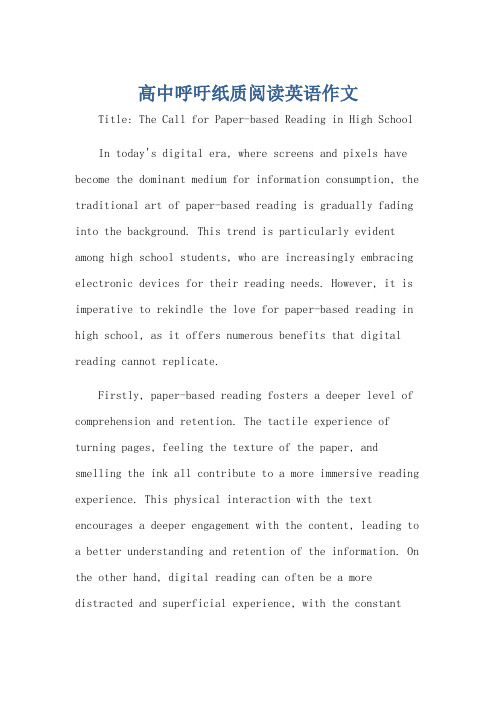
高中呼吁纸质阅读英语作文Title: The Call for Paper-based Reading in High School In today's digital era, where screens and pixels have become the dominant medium for information consumption, the traditional art of paper-based reading is gradually fading into the background. This trend is particularly evident among high school students, who are increasingly embracing electronic devices for their reading needs. However, it is imperative to rekindle the love for paper-based reading in high school, as it offers numerous benefits that digital reading cannot replicate.Firstly, paper-based reading fosters a deeper level of comprehension and retention. The tactile experience of turning pages, feeling the texture of the paper, and smelling the ink all contribute to a more immersive reading experience. This physical interaction with the text encourages a deeper engagement with the content, leading to a better understanding and retention of the information. On the other hand, digital reading can often be a more distracted and superficial experience, with the constanttemptation to skim through text or get distracted by notifications and other online distractions.Secondly, paper-based reading promotes better concentration and focus. In a world filled with constant distractions and notifications, it can be challenging to maintain focus when reading on electronic devices. The bright screens and constant influx of information can overstimulate the senses, making it difficult to concentrate on the text. Conversely, reading from paper allows for a more peaceful and focused reading environment, free from the distractions of the digital world. This improved concentration can lead to better comprehension and a more enjoyable reading experience.Moreover, paper-based reading is beneficial for the development of reading skills. High school students arestill in the process of honing their reading skills, and paper-based reading provides a more authentic andtraditional way to practice these skills. The ability to navigate through a physical book, make annotations, and refer back to previous pages is crucial for effective reading comprehension. These skills are not easilyreplicated on electronic devices, where the reading experience is often more linear and limited.Furthermore, paper-based reading has a unique cultural and emotional value. Books have been a source of inspiration, knowledge, and entertainment for centuries,and they hold a special place in our cultural heritage. Reading from paper allows us to connect with this rich cultural history and appreciate the beauty of the written word. The experience of holding a book, flipping throughits pages, and discovering new worlds is an irreplaceablejoy that cannot be replicated by digital reading.In conclusion, the call for paper-based reading in high school is not just a nostalgic longing for the past but a recognition of the inherent benefits of this traditional reading method. Paper-based reading fosters deeper comprehension and retention, promotes better concentration and focus, aids in the development of reading skills, and holds unique cultural and emotional value. Therefore, it is essential to encourage high school students to embracepaper-based reading and integrate it into their daily lives.By doing so, we can help them cultivate a love for reading that will benefit them throughout their lives.。
CallforPapers-华裔美国文学研究中心-北京外国语大学
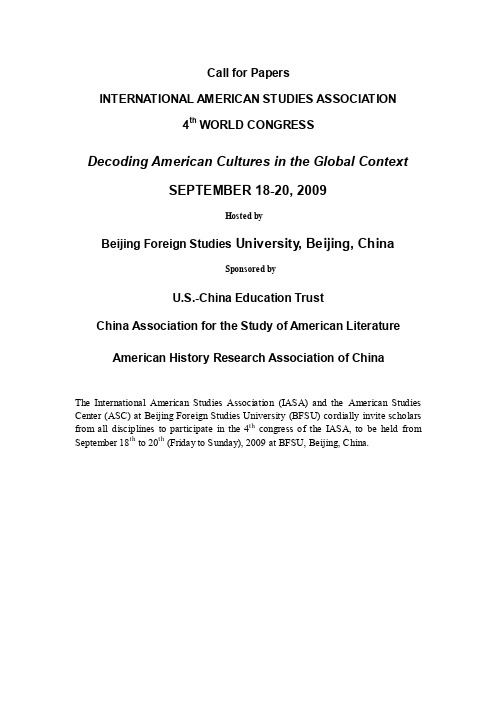
Call for PapersINTERNA TIONAL AMERICAN STUDIES ASSOCIA TION4th WORLD CONGRESSDecoding American Cultures in the Global ContextSEPTEMBER 18-20, 2009Hosted byBeijing Foreign Studies University, Beijing, ChinaSponsored byU.S.-China Education TrustChina Association for the Study of American Literature American History Research Association of ChinaThe International American Studies Association (IASA) and the American Studies Center (ASC) at Beijing Foreign Studies University (BFSU) cordially invite scholars from all disciplines to participate in the 4th congress of the IASA, to be held from September 18th to 20th (Friday to Sunday), 2009 at BFSU, Beijing, China.Congress Theme and Sub-themesRecent changes in the flows of finances, people, and cultural products, often termed …globalization‟, have provided a new context for understanding the Americas, hence the theme of the 4th World Congress, “Decoding American Culture s in the Global Context”. We invite contributions addressing the following sub-themes with reference to the U.S. and the Americas more broadly.a)Critical understanding and reception of American cultures abroadb)Impact of North/South American cultures on world culturesc)Comparative studies of the Americasd)“Globalization” vs. “Americanization”e)American studies abroadf)“American exceptionalism”: myth or reality?g)Myths that Americans live by: literature, history, and culture Guidelines for Submission and PresentationProposals may be submitted in English for an individual presentation, or for a pre-constituted panel, by March 31, 2009. Proposals for workshops to be developed into pre-constituted panels must be submitted by March 1, 2009 to be posted on the website (see below).∙For an individual paper, the organizer should submit the following: contact information of the organizer including email address, 3 keywords, and an abstract of no more than 300 words. Note any audio/visual equipment required.∙For a pre-constituted panel, the organizer should submit contact information of the organizer, 3 keywords describing the panel, and an abstract of no more than 300 words for the panel as a whole articulating how the papers go together PLUS contact information for each participant, and a brief abstract of no more than 300 words for each of those papers, along with 3 keywords for each. Indicate any audio visual equipment needed please.∙If you desire to submit a preconsituted panel, but need to find colleagues from other institutions and countries to participate in your panel, we offer the following option of proposing a WORKSHOP TITLE AND ABSTRACT.Send this, along with your contact information to the conference organizers (Prof. Li Qikeng below) by March 1, 2009 to be posted on the conference website. Individual scholars should then send proposals and contact information directly to you for your consideration. Once you have selected your panel members, submit as described above for pre-constituted panels,AND, in addition, send all non-selected papers along with their contact information, keywords, etc. to the conference committee for further consideration by the cut-off date of March 31st. Those papers will then be considered for inclusion on the program as part of other panels if appropriate.∙Each proposal should indicate any audio visual needs at the time of submission. No panel should have more than four paper presenters, or three presenters and a commentator. For pre-constituted panels, priority will be given to those which include presenters from a variety of institutions/ geographical locations. The academic committee of the congress will evaluate the proposal on the basis of the quality of the abstract, its scholarly cogency, as well as its relevance to the congress theme, and notify the submitter of its acceptance by April 30, 2009. If the submission is accepted, an extended summary (about 800-1,000 words) shall be sent to the conference coordinators by July 31, 2009.Each participant will be given 15 minutes to present the paper, followed by 5 minutes for questions and answers. The conference will provide the necessary multimedia for presentations. When submitting the extended summary, please also indicate whether you will need to use multimedia, and if so, specify your exact requirements. We also welcome proposals for presentations that do not fit the standard spoken paper format, such as films/videos/performances, etc.Post-Congress PublicationIf you would like the congress committee to consider your paper for publication, please submit your full paper within one month after the conclusion of the congress to the organizers. The academic committee of the congress will review all the papers submitted and have the selected papers published by a reputable publisher in China. All papers are preferably around 8,000 words in English, complete with footnotes and a bibliography. For paper format, CMS is recommended.Important Dates∙March 31, 2009: Proposal due (March.1st, 200p wo rkshop proposals due for posting)∙April 30, 2009: Notification of acceptance∙July 31, 2009: Extended summary due∙Sept. 18-20, 2009: Conference, (registration opens Sept. 17 on site).Congress FeesParticipants are expected to pay a conference fee of US$ 150, which covers the academic program, congress documentation (final program and book of abstracts), all meals on conference days, and coffee breaks. The student rate is $75 U.S.If not paid in advance, fees are higher, but may be paid on-site, in which case regular participants pay US$ 200 and students pay US$ 100. Hotels, meals on non-conference days, optional tours, etc are the responsibility of the participants themselves. Participants must be members of IASA, with the exception of participants from mainland China who will automatically become members of IASA upon registration for the conference.Hotel and ToursSpecial hotel rates for congress participants are being negotiated. Details will be posted on the congress website. Optional night-time activities such as attendance at performances and post-congress tours will also be available.Contact InformationPlease log onto for registration and submission of proposals.Y ou may also submit your proposals, summaries and other correspondence to congress coordinator, Prof. Li Qikeng.Email: liqikeng@, Phone: 86-10-8256-5621, 1352-184-7279;Fax: 86-10-8881-6282Postal address: School of English and International Studies, Beijing Foreign Studies University, Beijing 100089, China.国际美国研究学会第四届世界大会征文通知解读全球化视野下的美国文化时间:2009年9月18-20日地点:北京外国语大学主办:国际美国研究协会北京外国语大学美国研究中心协办:美中教育基金会全国美国文学研究会中国美国史研究会国际美国研究学会 (IASA) 和北京外国语大学美国研究中心(ASC) 诚挚邀请海内外致力于美国研究的各学科各领域专家学者,金秋时节相聚北京,参加国际美国研究学会的第四届世界大会。
新标准大学英语综合教程3课文翻译(1-10单元30篇)

Unit 1-1Catching crabs1 In the fall of our final year, our mood changed. The relaxed atmosphere of the preceding summer semester, the impromptu ball games, the boating on the Charles River, the late-night parties had disappeared, and we all started to get our heads down, studying late, and attendance at classes rose steeply again. We all sensed we were coming to the end of our stay here, that we would never get a chance like this again, and we became determined not to waste it. Most important of course were the final exams in April and May in the following year. No one wanted the humiliation of finishing last in class, so the peer group pressure to work hard was strong. Libraries which were once empty after five o'clock in the afternoon were standing room only until the early hours of the morning, and guys wore the bags under their eyes and their pale, sleepy faces with pride, like medals proving their diligence.2 But there was something else. At the back of everyone's mind was what we would do next, when we left university in a few months' time. It wasn't always the high flyers with the top grades who knew what they were going to do. Quite often it was the quieter, less impressive students who had the next stages of their life mapped out. One had landed a job in his brother's advertising firm in Madison Avenue, another had got a script under provisional acceptance in Hollywood. The most ambitious student among us was going to work as a party activist at a local level. We all saw him ending up in the Senate or in Congress one day. But most people were either looking to continue their studies, or to make a living with a white-collar job in a bank, local government, or anything which would pay them enough to have a comfortable time in their early twenties, and then settle down with a family, a mortgage and some hope of promotion.3 I went home at Thanksgiving, and inevitably, my brothers and sisters kept asking me what I was planning to do. I didn't know what to say. Actually, I did know what to say, but I thought they'd probably criticize me, so I told them what everyone else was thinking of doing.4 My father was watching me but saying nothing. Late in the evening, he invited me to his study. We sat down and he poured 抓螃蟹1.大学最后一年的秋天,我们的心情变了。
造纸术英文版

-----WORD格式--可编辑--专业资料-----Paper-making is one of the four great inventions of China, the paper is the han long experience accumulation and the crystallization of the wisdom of working people, human a brilliant invention in the history of civilization. China is the world's earliest sericulture silk in the world. Han Chinese working people above cocoon silk silk, such as the remaining evil cocoon, cocoon disease such as flocculant with legal system take silk floss. After floating flocculant, woven bamboo mat legacy will be some residual effect. When the number of floating flocculant, woven bamboo mat on the residual flocculant product into a layer of fiber sheet, after dry stripping down, can be used for writing. This flocculant floating there aren't many by-products, and call it HeTi or FangXu on ancient book. This suggests that the origin of the hanlun in the bark, hemp heads and our raw materials such as cloth, fishing nets, after falling, dao, copy paper, drying technology, manufacturing, is the origin of modern paper. This paper, the raw material is easy to find and very cheap, quality is also improved, gradually widely used. In honour of the feat, CAI lun later generations called this paper "Cai Hou paper"东汉元兴元年(105)蔡伦改进了造纸术,他用树皮、麻头及敝布、鱼网等原料,经过挫、捣、抄、烘等工艺制造的纸,是现代纸的渊源。
六年级上册英语-Unit 3 Holiday fun单元知识点-译林版

Unit 3一、单词1.holiday [ˈhɒlədeɪ] n. 假日,假期2.N a tional Day [ˈnæʃnəl]国庆节3.c all[kɔ:l]v. 打电话4.B u nd [bʌnd] n. 外滩5.st ar[stɑ:(r)]n. 星星6.s quare[s kweə(r)] n. 广场7.f a shion [ˈfæʃn] n. 时尚,时装8.e xcited [ɪkˈsaɪtɪd] adj. 激动的,兴奋的9.f ir st [fɜ:st] n. 第一at first 首先10.b o ttle [ˈbɒtl] n. 瓶子11.p a per [ˈp eɪpə(r)] n. 纸a piece of paper/ two piece s of paper12.P a lace M u seum [ˈpælɪs] [m ju:ˈzɪəm] 故宫the Imperial Palace [ɪmˈpɪəriəl]/the Forbidden City [fəˈbɪdn]13.ask [ɑ:sk] v. 问二、词组整理1. 假期趣事holiday fun 【fun不可数名词】have a lot of fun= have great fun 玩得开心,过得愉快2. 回到学校come back to school来到学校come to school欢迎来到… welcome to…欢迎回到…welcome back to…3. 国庆节the National Day国庆节假期the National Day holiday在国庆节假期之后after the National Day holiday4. 假期你去哪里了?Where did you go for the holiday?5. 给他打电话call him 【call 动词+ 宾格】6. 在家at home 不在家be not at home7. 去上海go to Shanghai【城市名词国名不要加the】8. 拜访我的阿姨visit my aunt 9. 上海博物馆the Shanghai Museum10. 看见许多有趣的东西see many interesting things11. 你的假期如何?How was/is your holiday?询问… 如何,How is/was..? 复数用How are/were…?12. 非常有趣great fun13. 去一个在星星湖旁边的农场go to a farm near Star Lake14. 摘一些橘子pick some oranges拾起pick up15. 去钓鱼go fishing 【go+ 动词ing】16. 捉了一些鱼catch some fish 【fish单复同形】17. 想要给你这条鱼want to give you this fish = want to give this fish to you18. 谈谈你的旅游经历talk about your travel experience19. 谈论某事talk about sth 20. 和某人谈话talk to /with sb21. 一个树上的苹果an apple from the tree22. 一条海里的鱼a fish from the sea23. 三个主要学校假期three main school holidays24. 复活节the Easter holiday 25. 暑假the summer holiday26. 圣诞节假期the Christmas holiday27. 是吃晚饭的时间了。
国际学术交流英语-call for paper教程文件
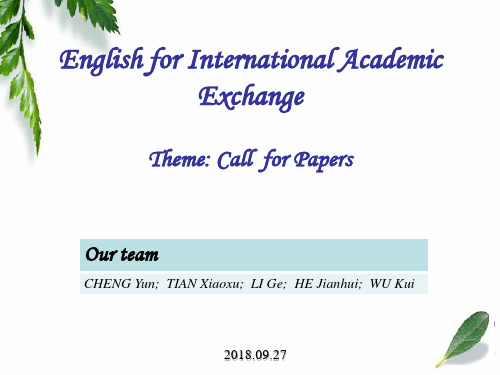
in Eengeering Geology or Bulletin of Eengeering Geology and the Environment.
3. Conference goals
➢State the purpose of the meeting ➢ Introduced the topics of discussion ➢Discuss ideas and solutions to the problem
4. Time and venue
7. Important dates
➢You may meet some deadlines, such as
➢Sub-mission Deadline,
➢Acceptance Deadline
Therefore, you must complete the manuscript submission, pay the attendance fee, and reply the a Letter of acceptance of the invitation within the requested time.
ering and offshore engineering facilities have been
designed and constructed in recent dacades……
6. Papers and submissions
➢Generally, conference papers consist of two forms, full paper and abstract paper
学术英语写作Unit-6-Notice-of-Abstract-or-Paper-Acceptanc
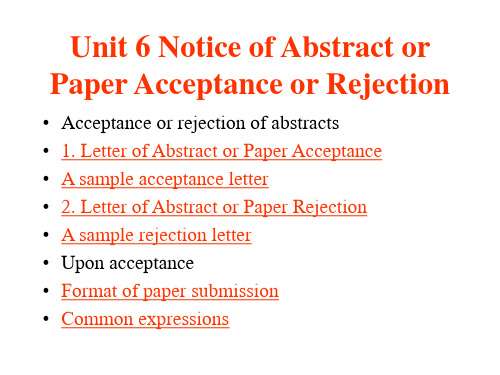
Why is a letter of acceptance written?
• To extend best wishes or regards to the writer.
• To inform the writer that his abstract or paper has been accepted by the conference committee and he is expected to attend the conference if possible.
1. Letter of Abstract or Paper Acceptance
• Why is a letter of acceptance written? • What should be included in the letter? • What is the format of an acceptance letter?
新视野大学英语综合教程3 课文及课文翻译
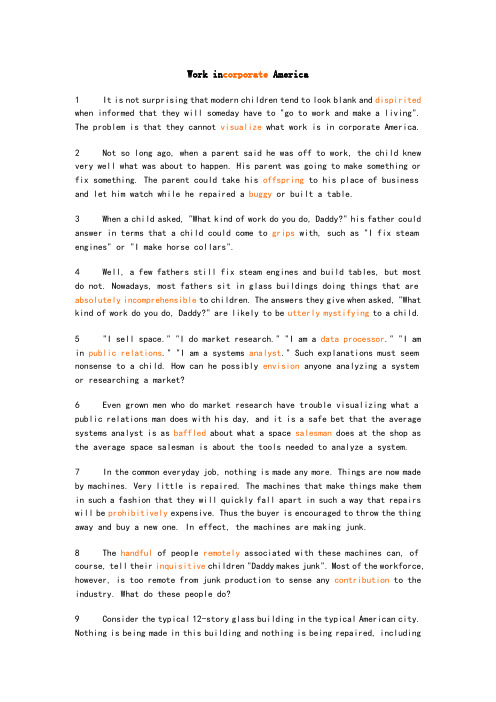
Work in corporate America1 It is not surprising that modern children tend to look blank and dispirited when informed that they will someday have to "go to work and make a living". The problem is that they cannot visualize what work is in corporate America.2 Not so long ago, when a parent said he was off to work, the child knew very well what was about to happen. His parent was going to make something or fix something. The parent could take his offspring to his place of business and let him watch while he repaired a buggy or built a table.3 When a child asked, "What kind of work do you do, Daddy?" his father could answer in terms that a child could come to grips with, such as "I fix steam engines" or "I make horse collars".4 Well, a few fathers still fix steam engines and build tables, but most do not. Nowadays, most fathers sit in glass buildings doing things that are absolutely incomprehensible to children. The answers they give when asked, "What kind of work do you do, Daddy?" are likely to be utterly mystifying to a child.5 "I sell space." "I do market research." "I am a data processor." "I am in public relations." "I am a systems analyst." Such explanations must seem nonsense to a child. How can he possibly envision anyone analyzing a system or researching a market?6 Even grown men who do market research have trouble visualizing what a public relations man does with his day, and it is a safe bet that the average systems analyst is as baffled about what a space salesman does at the shop as the average space salesman is about the tools needed to analyze a system.7 In the common everyday job, nothing is made any more. Things are now made by machines. Very little is repaired. The machines that make things make them in such a fashion that they will quickly fall apart in such a way that repairs will be prohibitively expensive. Thus the buyer is encouraged to throw the thing away and buy a new one. In effect, the machines are making junk.8 The handful of people remotely associated with these machines can, of course, tell their inquisitive children "Daddy makes junk". Most of the workforce, however, is too remote from junk production to sense any contribution to the industry. What do these people do?9 Consider the typical 12-story glass building in the typical American city. Nothing is being made in this building and nothing is being repaired, includingthe building itself. Constructed as a piece of junk, the building will be discarded when it wears out, and another piece of junk will be set in its place.10 Still, the building is filled with people who think of themselves as working. At any given moment during the day perhaps one-third of them will be talking into telephones. Most of these conversations will be about paper, for paper is what occupies nearly everyone in this building.11 Some jobs in the building require men to fill paper with words. There are persons who type neatly on paper and persons who read paper and jot notes in the margins. Some persons make copies of paper and other persons deliver paper. There are persons who file paper and persons who unfile paper.12 Some persons mail paper. Some persons telephone other persons and ask that paper be sent to them. Others telephone to ascertain the whereabouts of paper. Some persons confer about paper. In the grandest offices, men approve of some paper and disapprove of other paper.13 The elevators are filled throughout the day with young men carrying paper from floor to floor and with vital men carrying paper to be discussed with other vital men.14 What is a child to make of all this? His father may be so eminent that he lunches with other men about paper. Suppose he brings his son to work to give the boy some idea of what work is all about. What does the boy see happening?15 His father calls for paper. He reads paper. Perhaps he scowls at paper. Perhaps he makes an angry red mark on paper. He telephones another man and says they had better lunch over paper.16 At lunch they talk about paper. Back at the office, the father orders the paper retyped and reproduced in quintuplicate, and then sent to another man for comparison with paper that was reproduced in triplicate last year.17 Imagine his poor son afterwards mulling over the mysteries of work witha friend, who asks him, "What's your father do?" What can the boy reply? "It beats me," perhaps, if he is not very observant. Or if he is, "Something that has to do with making junk, I think. Same as everybody else."在美国大公司工作要是有人跟现在的孩子说他们长大后要“去工作以谋生”,他们往往会表现出一脸的茫然和沮丧,这并不奇怪。
call_for_paper
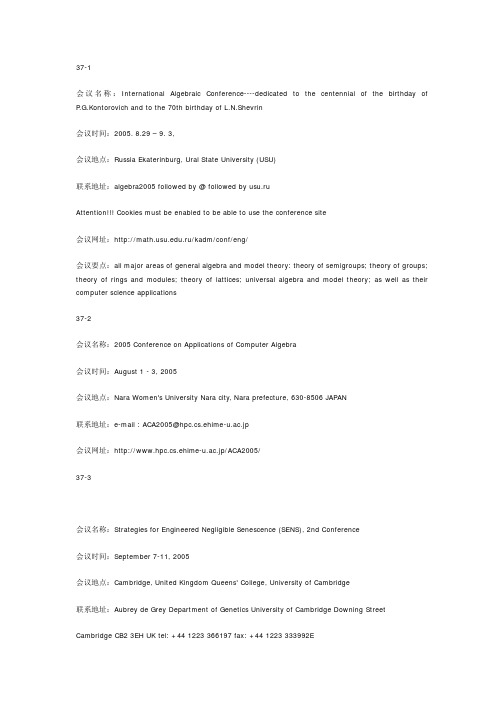
37-1会议名称:International Algebraic Conference----dedicated to the centennial of the birthday of P.G.Kontorovich and to the 70th birthday of L.N.Shevrin会议时间:2005. 8.29 – 9. 3,会议地点:Russia Ekaterinburg, Ural State University (USU)联系地址:algebra2005 followed by @ followed by usu.ruAttention!!! Cookies must be enabled to be able to use the conference site会议网址:.ru/kadm/conf/eng/会议要点:all major areas of general algebra and model theory: theory of semigroups; theory of groups; theory of rings and modules; theory of lattices; universal algebra and model theory; as well as their computer science applications37-2会议名称:2005 Conference on Applications of Computer Algebra会议时间:August 1 - 3, 2005会议地点:Nara Women's University Nara city, Nara prefecture, 630-8506 JAPAN联系地址:e-mail : ACA2005@hpc.cs.ehime-u.ac.jp会议网址:http://www.hpc.cs.ehime-u.ac.jp/ACA2005/37-3会议名称:Strategies for Engineered Negligible Senescence (SENS), 2nd Conference会议时间:September 7-11, 2005会议地点:Cambridge, United Kingdom Queens' College, University of Cambridge联系地址:Aubrey de Grey Department of Genetics University of Cambridge Downing StreetCambridge CB2 3EH UK tel: +44 1223 366197 fax: +44 1223 333992Email: ag24@会议网址:/sens2/主办者:Aubrey de Grey37-41会议名称:9th International Conference on Environmental Science and Technology-2005 (9CEST 2005)会议时间:2005. 9. 1-3,会议地点:Rhodes island, Greece联系地址:University of the Aegean 9th International Conference on Environmental Science and Technology (9 CEST) 30, Voulgaroktonou str., GR 114 72 Athens, Greece Tel.: +30 210 6492451, +30 210 6492452 Fax: +30 210 6492499 Email: cest@会议网址:/cest主办者:Global Network for Environmental Science and Technology University of the Aegean重要时间:Deadline for abstacts: 2004.12.15,37-5会议名称:International Conference on Internet Technologies and Applications (ITA 05)会议时间:September 7-9, 2005会议地点:Wrexham, North Wales, United Kingdom ;Centre for Applied Internet Research (CAIR)联系地址:ITA 05 Secretary Centre for Applied Internet Research, University of Wales, NEWI Plas Coch Campus, Wrexham, LL11 2AW, UK Tel: +44(0)1978 293203 Fax: +44(0)1978 293168 Email: d.oram@会议网址:/computing/research/ita05/index.shtml主办者:Centre for Applied Internet Research (CAIR)重要时间:Deadline for abstacts: February 04, 200537-6会议名称:Pedometrics 2005: Frontiers in Pedometrics会议时间:September 12-14, 2005会议地点:Naples, FL, USA联系地址:University of Florida/IFAS Soil and Water Science Department 2169 McCarty Hall, P.O. Box 110290 Gainesville, FL USA PHONE: 352-392-1951 ext. 204 FAX: 352-392-3902 EMAIL: SGrunwald@会议网址:/pedometrics主办者:University of Florida / IFAS - More to Be Determined重要时间:论文(文摘)截止:2005. 5. 01,37-7会议名称:Ninth East-European Conference on Advances in Databases and Information Systems (ADBIS'2005)会议时间:2005. 9. 12-15,会议地点:Estonia Tallinn联系地址:Institute of Cybernetics Tallinn University of Technology Akadeemia 21 12618 TallinnEstonia Email: adbis05@cs.ioc.ee会议网址:http://www.cs.ioc.ee/adbis2005主办者:Institute of Cybernetics at Tallinn University of Technology and Department of Computer Engineering of Tallinn University of Technology CONFERENCE ORGANISATION重要时间:论文(文摘)截止:2005. 2. 28,37-8会议名称:Weekend workshop on Arithmetic and Geometry of Higher Dimensional Varieties with Special Emphasis on Calabi-Yau Varieties and Mirror Symmetry会议时间:October 23-24, 2005会议地点:Toronto, ON, Canada Fields Institute联系地址:Phone: 416-348-9710 Business Fax: 416-348-9714 Members Fax: 416-348-9385 The Fields Institute for Research in Mathematical Sciences 222 College StreetToronto, Ontario · M5T 3J1 · Canada , E-Mail: geninfo@fields.utoronto.ca会议网址:http://www.fields.utoronto.ca/programs/scientific/04-05/algebraic_varieties/主办者:ames D. Lewis (Alberta) and Noriko Yui (Queen's)37-9会议名称:ICINCO 2005 – International Conference on Informatics in Control, Automation and Robotics 会议时间:2005.9. 14-17,会议地点:Barcelona, Spain联系地址:ICINCO Secretariat Address: Av. D.Manuel I, 27 r/c esq. 2910-595 Setúbal –PortugalTel.: +351 265 520 185 Fax: +351 265 520 186 e-mail: secretariat@会议网址:重要时间:论文(全文)截止:2005.2.25, 录用通知: 2005.4.2037-10会议名称:International Conference - Mathematics in Finance会议时间:August 7-12, 2005会议地点:Kruger National Park, South Africa ; Berg-en-dal Camp联系地址:Department of Mathematics and Applied Mathematics University of Pretoria 0002 PRETORIA SOUTH AFRICA Tel: 27/12/420-2520 Fax: 27/12/420-3893Email: mfinance@cam.wits.ac.za会议网址:http://www.mif.up.ac.za/主办者:Potchefstroom University for CHE, The University of Pretoria and The University of the Witwatersrand.重要时间:论文(文摘)截止:2005. 4. 01,37-11会议名称:The International Conference on Efficient Infrastructure Development (INCEID2005)会议时间:August 29-30, 2005会议地点:Kuala Lumpur, Malaysia, University of Malaya联系地址:Centre for Nanotechnology, Precision & Advanced Materials Department ofMechanical Engineering Faculty of Engineering University of Malaya 50603 Kuala Lumpur MALAYSIA Email: conference@.my or cnpam@.my会议网址:.my/conference/inceid2005主办者:Centre for Nanotechnology, Precision & Advanced Materials Department ofMechanical Engineering Faculty of Engineering University of Malaya MALAYSIA重要时间:Deadline for abstacts: April 30, 200537-12会议名称:2005年度国际符号和代数计算会议(ISSAC2005) ---International Symposium on Symbolic and Algebraic Computation会议时间:2005年7月24-27日会议地点:Beijing Friendship Hotel会议网址:/issac2005/。
call for papers
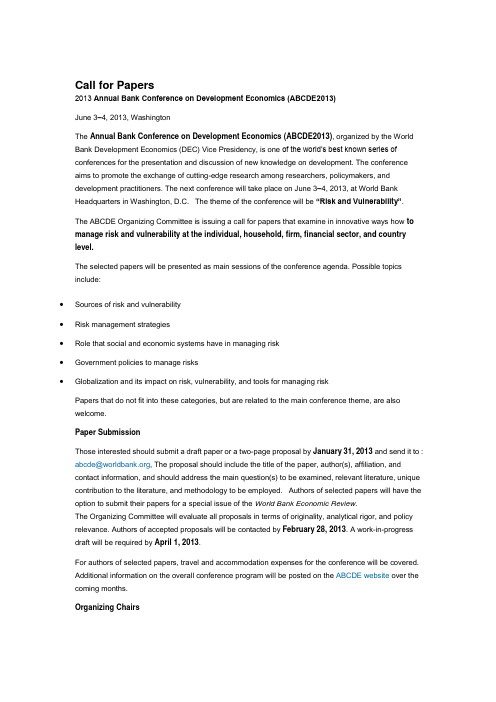
Call for Papers2013 Annual Bank Conference on Development Economics (ABCDE2013)June 3–4, 2013, WashingtonThe Annual Bank Conference on Development Economics (ABCDE2013), organized by the World Bank Development Economics (DEC) Vice Presidency,is one of the world’s best known series ofconferences for the presentation and discussion of new knowledge on development. The conference aims to promote the exchange of cutting-edge research among researchers, policymakers, anddevelopment practitioners. The next conference will take place on June 3–4, 2013, at World BankHeadquarters in Washington, D.C. The theme of the conference will be “Risk and Vulnerability”.The ABCDE Organizing Committee is issuing a call for papers that examine in innovative ways how to manage risk and vulnerability at the individual, household, firm, financial sector, and country level.The selected papers will be presented as main sessions of the conference agenda. Possible topics include:∙Sources of risk and vulnerability∙Risk management strategies∙Role that social and economic systems have in managing risk∙Government policies to manage risks∙Globalization and its impact on risk, vulnerability, and tools for managing riskPapers that do not fit into these categories, but are related to the main conference theme, are also welcome.Paper SubmissionThose interested should submit a draft paper or a two-page proposal by January 31, 2013and send it to :abcde@, The proposal should include the title of the paper, author(s), affiliation, and contact information, and should address the main question(s) to be examined, relevant literature, unique contribution to the literature, and methodology to be employed. Authors of selected papers will have the option to submit their papers for a special issue of the World Bank Economic Review.The Organizing Committee will evaluate all proposals in terms of originality, analytical rigor, and policy relevance. Authors of accepted proposals will be contacted by February 28, 2013. A work-in-progress draft will be required by April 1, 2013.For authors of selected papers, travel and accommodation expenses for the conference will be covered.Additional information on the overall conference program will be posted on the ABCDE website over the coming months.Organizing ChairsAsliDemirgüç-Kunt (World Bank, Chair), Charles Calomiris (Columbia University), and Stefan Dercon (Oxford University and DFID Chief Economist)。
call短语

call on sb=drop in on sb拜访某人 call back 回电话 call for要求,需要;邀约(同往)接,取;为呼喊 call in 来访;召来,召集,请来 call up 给…打电话;征召(入伍);使想起(往事) call at(sp.) 访问、拜访(某地) call off 取消
calls for a) The occasion ______ 需要,要求rapid action. called in 叫来to cut b) The army was ______ through the fallen trees. called on c) I ________ 看望my parents every week. called at d) He _________ 到 ,拜访my house that day.
Call for Papers
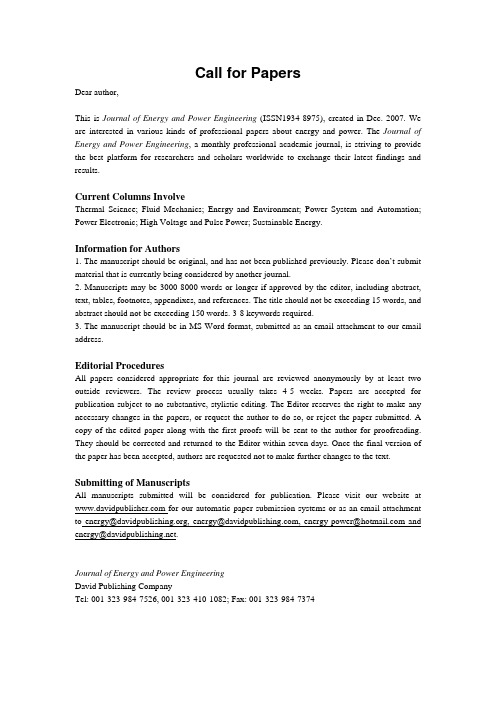
Call for PapersDear author,This is Journal of Energy and Power Engineering (ISSN1934-8975), created in Dec. 2007. We are interested in various kinds of professional papers about energy and power. The Journal of Energy and Power Engineering, a monthly professional academic journal, is striving to provide the best platform for researchers and scholars worldwide to exchange their latest findings and results.Current Columns InvolveThermal Science; Fluid Mechanics; Energy and Environment; Power System and Automation; Power Electronic; High Voltage and Pulse Power; Sustainable Energy.Information for Authors1. The manuscript should be original, and has not been published previously. Please don’t submit material that is currently being considered by another journal.2. Manuscripts may be 3000-8000 words or longer if approved by the editor, including abstract, text, tables, footnotes, appendixes, and references. The title should not be exceeding 15 words, and abstract should not be exceeding 150 words. 3-8 keywords required.3. The manuscript should be in MS Word format, submitted as an email attachment to our email address.Editorial ProceduresAll papers considered appropriate for this journal are reviewed anonymously by at least two outside reviewers. The review process usually takes 4-5 weeks. Papers are accepted for publication subject to no substantive, stylistic editing. The Editor reserves the right to make any necessary changes in the papers, or request the author to do so, or reject the paper submitted. A copy of the edited paper along with the first proofs will be sent to the author for proofreading. They should be corrected and returned to the Editor within seven days. Once the final version of the paper has been accepted, authors are requested not to make further changes to the text.Submitting of ManuscriptsAll manuscripts submitted will be considered for publication. Please visit our website at for our automatic paper submission systems or as an email attachment ****************************,**************************,*************************** **************************.Journal of Energy and Power EngineeringDavid Publishing CompanyTel: 001-323-984-7526, 001-323-410-1082; Fax: 001-323-984-7374。
新标准大学英语综合教程3课文原文
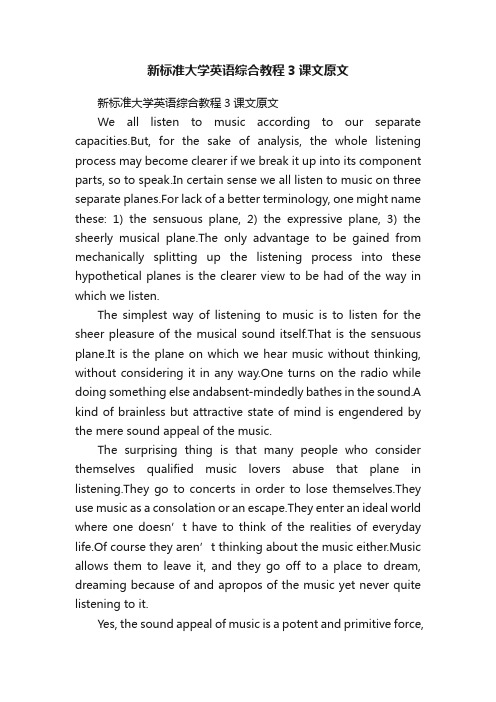
新标准大学英语综合教程3课文原文新标准大学英语综合教程3课文原文We all listen to music according to our separate capacities.But, for the sake of analysis, the whole listening process may become clearer if we break it up into its component parts, so to speak.In certain sense we all listen to music on three separate planes.For lack of a better terminology, one might name these: 1) the sensuous plane, 2) the expressive plane, 3) the sheerly musical plane.The only advantage to be gained from mechanically splitting up the listening process into these hypothetical planes is the clearer view to be had of the way in which we listen.The simplest way of listening to music is to listen for the sheer pleasure of the musical sound itself.That is the sensuous plane.It is the plane on which we hear music without thinking, without considering it in any way.One turns on the radio while doing something else andabsent-mindedly bathes in the sound.A kind of brainless but attractive state of mind is engendered by the mere sound appeal of the music.The surprising thing is that many people who consider themselves qualified music lovers abuse that plane in listening.They go to concerts in order to lose themselves.They use music as a consolation or an escape.They enter an ideal world where one doesn’t have to think of the realities of everyday life.Of course they aren’t thinking about the music either.Music allows them to leave it, and they go off to a place to dream, dreaming because of and apropos of the music yet never quite listening to it.Yes, the sound appeal of music is a potent and primitive force,but you must not allow it to usurp a disproportionate share of your interest.The sensuous plane is an important one in music, a very important one, but it does not constitute the whole story.The second plane on which music exists is what I have called the expressive one.Here, immediately, we tread on controversial /doc/c315869164.html,posers have a way of shying away fro m any discussion of m usic’s expressive side.Did not Stravinsky himself proclaim that his music was an “object”, a “thing”, with a life of its own, and with no other meaning than its own purely musical existence?This intransigent attitude of Stravinsky’s m ay be due to the fact that so many people have tried to read different meanings into so many pieces.Heaven knows it is difficult enough to say precisely what it is that a piece of music means, to say it definitely to say it finally so that everyone is satisfied with your explanation.But that should not lead one to the other extreme of denying to music the right to be “expressive”.Listen, if you can,to the 48 fugue themes of Bach’s Well-tempered Clavichore.Listen to each theme, one after another.You will soon realize that each theme mirrors a different world of feeling.You will also soon realize that the more beautiful a theme seems to you the harder it is to find any word that will describe it to your complete satisfaction.Yes, you will certainly know whether it is a gay theme or a sad one.You will be able, on other words, in your own mind, to draw a frame of emotional feeling around your theme.Now study the sad one a little closer.Try to pin down the exact quality of its sadness.Is it pessimistically sad or resignedly sad; is it fatefully sad or smilingly sad?Let us suppose that you are fortunate and can describe to your own satisfaction in so many words the exact meaning ofyour chosen theme.There is still no guarantee that anyone else will be satisfied.Nor need theybe.The important thing is that each one feels for himself the specific expressive quality of a theme or, similarly, an entire piece of music.And if it is a great work of art, don’t expect it to mean exactly the same thing to you each time you return to it.The third plane on which music exists is the sheerly musical plane.Besides the pleasurable sound of music and the expressive feeling that it gives off, music does exist in terms of the notes themselves and of their manipulation.Most listeners are not sufficiently conscious of this third plane.It is very important for all of us to become more alive to music on its sheerly musical plane.After all, an actual musical material is being used.The intelligent listener must be prepared to increase his awareness of the musical material and what happens to it.He must hear the melodies, the rhythms, the harmonies, the tone colors in a more conscious fashion.But above all he must, in order to follow the line of the composer’s thought, know something of the principles of musical form.Listening to all of these elements is listening to the sheerly musical plane.Let me repeat that I have split up mechanically the three separate planes on which we listen merely for the sake of greater clarity. Actually, we never listen on one or the other of these planes.What we do is to correlate them—listening in all three ways at the same time.It takes no mental effort, for we do it instinctively Perhaps an analogy with what happens to us when we visit the theater will make this instinctive correlation clearer.In the theater, you are aware of the actors and actresses, costumes and sets, sounds and movements.All these give one the sensethat the theater is a pleasant place to be in.They constitute the sensuous plane in our theatrical reactions.The expressive plane in the theater would be derived from the feeling that you get from what is happening on the stage.You are moved to pity, excitement, or gaiety.It is this general feeling, generated aside from the particular words being spoken, a certain emotional something which exists on the stage,that isanalogous to the expressive quality in music.The plot and plot development is equivalent to our sheerly musical plane.The playwright creates and develops a character in just the same way that a composer creates and develops a theme.According to the degree of your awareness of the way in which the artist in either field handles his material will you become a more intelligent listener.It is easy enough to see that the theatergoer never is conscious of any of these elements separately.He is aware of them all at the same time.The same is true of music listening.We simultaneously and without thinking listen on all three planes.It is not surprising that modern children tend to look blank and dispirited when i nformed that they will someday have to “go to work andmake a living”. The problem is that they cannot visualize what work is in corporate Am erica.Not so long ago, when a parent said he was off to work, the child knew very well what was about to happen. His parent was going to make something or fix something. T he parent could take his offspring to his place of business and let him watch while he re paired a buggy or built a table.When a child asked, “What kind of work do you do, Daddy?” his father could an swer in terms that a child could come to gripswith, such as “I fix steam engines” or “I make horse collars.Well, a few fathers still fix steam engines and build tables, but most do not. Nowa days, most fathers sit in glass buildings doing things that are absolutely incomprehensib le to children. The answers they give when asked, “What kind of work do you do, Dadd y?” are likely to be utterlymystifying to a child.”I sell space””I do market research.”,”I am a data processor.””I am in public rel ations.””I am a systems analyst” Suchexplanations must seem nonsense to a child. How can he possibly envision anyone analy zing a system or researching a market?Even grown men who do market research have trouble visualizing what a public relations man does with his day, and it is a safe bet that the average systems analyst is as baffled about what a space salesman does at the shop as the average space salesman is about the tools needed to analyze a system.In the common everyday job, nothing is made any more. Things are now made b y machines. Very little is repaired. The machines that makethings make them in such a fashion that they will quickly fall apart in such a way that r epairs will be prohibitively expensive. Thus the buyer isencouraged to throw the thing away and buy a new one. In effect, the machines are mak ing junk.The handful of people remotely associated withthese machines can, of course, tell their inquisitive children “Daddy makes junk”. Most of the workforce, however, is too remote from junkproduction to sense any contribution to the industry. What do these people do?Consider the typical 12-story glass building in the typical American city. Nothing is being made in this building and nothing is being repaired, including the building its elf. Constructed as a piece of junk, the building will be discarded when it wears out, a nd another piece of junk will be set in its place.Still, the building is filled with people who think of themselves as working. At a ny given moment during the day perhaps one-third of them will be talking into teleph ones. Most of these conversations will be about paper, for paper is what occupies nearl y everyone in this building. Somejobs in the building require men to fill paper with words. There are persons who type neatly on paper and persons who read paper and jot notes in the margins. Some perso ns make copies of paper and other persons deliver paper. There are persons who file p aper and persons who unfile paper.Some persons mail paper. Some persons telephone other persons and ask that p aper be sent to them. Others telephone to ascertain thewhereabouts of paper. Some persons confer about paper. In the grandest offices, men approve of some paper and disapprove of other paper.The elevators are filled throughout the day with young men carrying paper fro m floor to floor and with vital men carrying paper to bediscussed with other vital men.What is a child to make of all this? His father may be so eminent that he lunche s with other men about paper. Supposehe brings his son towork to give the boy some idea of what work is all about. What does the boy see hap pening?His father calls for paper. He reads paper. Perhaps he scowls at paper. Perhaps he makes an angry red mark on paper. He telephones another man and says they had better lunch over paper.At lunch they talk about paper. Back at the office, the father orders the paper r etyped and reproduced in quintuplicate, and then sent toanother man for comparison with paper that was reproduced in triplicate last year.Imagine his poor son afterwards mulling over the mysteries of work with a frie nd, who asks him, ”What’s your father do?” What can the boy reply? “It beats me,” p erhaps, if he is not very observant. Or if he is, “Somethi ng that has to do with making junk, I think. Same as everybodyelse.”It was snowing heavily, and although every true New Yorker looks forward to a white Christmas, the shoppers on Fifth Avenue were in a hurry, not just to track down the last-minute presents, but to escape the bitter cold and get home with their families for Christmas Eve.Josh Lester turned into 46th Street. He was not yet enjoying the Christmas spirit, because he was still at work, albeit a working dinner at Joanne's. Josh was black, in his early thirties, and an agreeable-looking person, dressed smartly but not expensively. He was from a hard-working family in upstate Virginia, and was probably happiest back home in his parents' house. But his demeanor concealed a Harvard law degree and an internship inDC with a congressman, a junior partnership in a New York law firm, along with a razor-sharp intellect and an ability to think on his feet. Josh was very smart.The appointment meant Josh wouldn't get home until after Christmas. He was not, however, unhappy. He was meeting Jo Rogers, the senior senator for Connecticut, and one of the best-known faces in the US. Senator Rogers was a Democrat in her third term of office, who knew Capitol Hill inside out but who had nevertheless managed to keep her credibility with her voters as a Washington outsider. She was pro-abortion, anti-corruption, pro-low carbon emissions and anti-capital punishment, as fine a progressive liberal as you could find this side of the Atlantic. Talk show hosts called her Honest Senator Jo, and a couple of years ago, Time magazine had her in the running for Woman of the Year. It was election time in the following year, and the word was she was going to run for the Democratic nomination. Rogers had met Josh in DC, thought him highly competent, and had invited him to dinner.Josh shivered as he checked the address on the slip of paper in his hand. He'd never been to Joanne's, but knew it by reputation, not because of its food, which had often been maligned, or its jazz orchestra, which had a guest slot for a well-known movie director who played trumpet, but because of the stellar quality of its sophisticated guests: politicians, diplomats, movie actors, hall-of-fame athletes, journalists, writers, rock stars and Nobel Prize winners – in short, anyone who was anyone in this city of power brokers.Josh told him, and although the waiter refrained from curling his lip, he managed to show both disdain and effortless superiority with a simple flaring of his nostrils.“Yes, Senator, please come this way,” and as Senator Rogers passed through the crowded room, heads turned as the diners recognized her and greeted her with silent applause. In a classless society, Rogers was the closest thing to aristocracy that America had. Alberto hovered for a moment, then went to speak to a colleague.After two hours, Rogers and Josh got up to leave. There was a further flurry of attention by the staff, including an offer by Alberto to waive payment of the bill, which Rogers refused. As they were putting on their coats, Rogers said, “Thank you, Alberto. Oh, have I introduced you to my companion, Josh Lester?”A look of panic, followed by one of desperate optimism flashed across Alberto's face.“Ah, not yet, no, ... not properly, ” he said weakly.“Josh Lester. This is the latest recruit to my election campaign. He's going to be my new deputy campaign manager, in charge of raising donations. And if we get that Republican out of the White House next year, you've just met my Chief of Staff.”It came as if from nowhere.There were about two dozen of us by the bank of elevators on the 35th floor of the north tower of the World Trade Center. We were firefighters, mostly, and we were in various stages of exhaustion. Some guys were sweating like pigs. Some had their turnout coats off, or tied around their waists. Quite a few were breathing heavily. Others were raring to go. All of us were taking a beat to catch our breaths, and our bearings, figure out what the hell was going on. We'd been at this thing, hard, for almost an hour, some a little bit less, and we were nowhere close to done. Of course, we had no idea what there was left to do, but wehadn't made a dent.And then the noise started, and the building began to tremble, and we all froze. Dead solid still. Whatever there had been left to do would now have to wait. For what, we had no idea, but it would wait. Or, it wouldn't, but that wasn't the point. The point was that no one was moving. To a man, no one moved, except to lift his eyes to the ceiling, to see where the racket was coming from. As if we could see clear through the ceiling tiles for an easy answer. No one spoke. There wasn't time to turn thought into words, even though there was time to think. For me anyway, there was time to think, too much time to think, and my thoughts were all over the place. Every possibleworst-case scenario, and a few more besides. The building was shaking like in an earthquake, like an amusement park thrill ride gone berserk, but it was the rumble that struck me still with fear. The sheer volume of it. The way it coursed right through me.I couldn't think what the hell would make a noise like that. Like a thousand runaway trains speeding towards me. Like a herd of wild beasts. Like the thunder of a rockslide. Hard to put it into words, but whatever the hell it was it was gaining speed, and gathering force, and getting closer, and I was stuck in the middle, unable to get out of its path.It's amazing, the kind of thing you think about when there should be no time to think. I thought about my wife and my kids, but only fleetingly and not in any kind of life-flashing-before-my-eyes sort of way. I thought about the job, how close I was to making deputy. I thought about the bagels I had left on the kitchen counter back at the firehouse. I thought how we firemen were always saying to each other, "I'll see you at the big one." Or, "We'll all meet at the big one." I never knew how it started, orwhen I'd picked up on it myself, but it was part of our shorthand.Meaning, no matter how big this fire is, there'll be another one bigger, somewhere down the road. We'll make it through this one, and we'll make it through that one, too. I always said it, at big fires, and I always heard it back, and here I was, thinking I would never say or hear these words again, because there would never be another fire as big as this. This was the big one we had all talked about, all our lives, and if I hadn't known this before –just before these chilling moments – this sick, black noise now confirmed it.I fumbled for some fix on the situation, thinking maybe if I understood what was happening I could steel myself against it. All of these thoughts were landing in my brain in a kind of flashpoint, one on top of the other and all at once, but there they were. And each thought landed fully formed, as if there might be time to act on each, when in truth there was no time at all.Richard Picciotto (also known as Pitch) was in the north tower of the World Trade Center when it collapsed in theaftermath of the massive terrorist attack on 11 September 2001. A battalion commander for the New York Fire Department, he was on the scene of the disaster within minutes of the attack, to lead seven companies of firefighters into the tower to help people trapped and to extinguish fires blazing everywhere.The north tower was the first of the twin towers to be hit. It was followed 17 minutes later by the south tower. The south tower, however, was the first to collapse, at 9:59 am. At that moment, Picciotto was in the north tower, racing upwards by the stairs because the elevators were out of action. He then gave the order to evacuate. On the 12th story he came across 50 people amid the debris, too badly hurt or frightened to move. Picciottoand his men helped them down. When he reached the seventh floor, the tower fell, and he was buried beneath thousands of tons of rubble. He eventually came round four hours later, leading his men to safety.Picciotto was the highest ranking firefighter to survive the attack. The chief of the department, the first deputy and the chief of rescue operations had all been killed. Altogether the death toll included 343 firefighters and more than 3,000 civilians.。
节约用纸倡议书英语作文
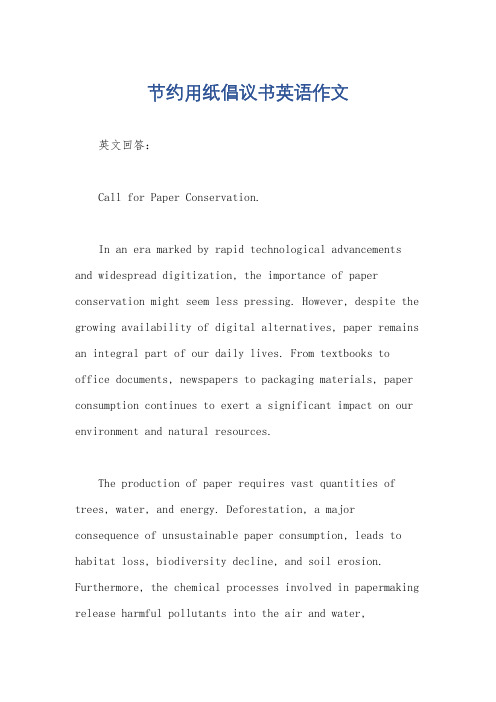
节约用纸倡议书英语作文英文回答:Call for Paper Conservation.In an era marked by rapid technological advancements and widespread digitization, the importance of paper conservation might seem less pressing. However, despite the growing availability of digital alternatives, paper remains an integral part of our daily lives. From textbooks to office documents, newspapers to packaging materials, paper consumption continues to exert a significant impact on our environment and natural resources.The production of paper requires vast quantities of trees, water, and energy. Deforestation, a major consequence of unsustainable paper consumption, leads to habitat loss, biodiversity decline, and soil erosion. Furthermore, the chemical processes involved in papermaking release harmful pollutants into the air and water,contributing to environmental degradation.Recognizing the urgent need to address theenvironmental impact of paper consumption, we issue thiscall for collective action towards paper conservation. By adopting simple but effective measures, we cansignificantly reduce our paper footprint and contribute toa more sustainable future.Reduce, Reuse, Recycle.The "Reduce, Reuse, Recycle" principle serves as the cornerstone of paper conservation efforts. Reducing our consumption of paper products is of paramount importance.By opting for digital communication whenever possible, printing only essential documents, and avoiding unnecessary packaging, we can minimize our demand for paper.Reusing paper also plays a crucial role in conservation. Instead of discarding paper after a single use, consider reusing it for note-taking, draft printing, or other non-critical purposes. By extending the lifespan of paper, wereduce the need for new production.Recycling is an essential component of paper conservation. When paper products reach the end of their useful life, they should be recycled rather than disposed of in landfills. By participating in recycling programs, we ensure that paper fiber is recovered and reused, reducing the consumption of virgin resources.Innovative Solutions.Beyond the traditional "Reduce, Reuse, Recycle" approach, innovative solutions are emerging to address paper consumption challenges. Digital document management systems allow for the secure storage and sharing of digital documents, eliminating the need for physical copies. Cloud-based platforms facilitate collaboration and communication, further reducing the reliance on paper.Education and Awareness.Education and awareness are vital to promotingsustainable paper consumption practices. By raising awareness about the environmental impact of paper production, we can encourage individuals and organizationsto make informed choices. Educational campaigns can focuson the benefits of digital communication, the importance of reusing and recycling paper, and the availability of innovative alternatives.Collective Responsibility.Paper conservation is a collective responsibility that requires the participation of all stakeholders. Individuals, businesses, and governments must work together to create a sustainable paper economy. Businesses can adopt eco-friendly procurement policies, prioritize digital communication, and invest in innovative solutions. Governments can implement policies that promote paper conservation and provide incentives for environmentally responsible practices.By embracing paper conservation as a collective effort, we can preserve our natural resources, protect theenvironment, and pave the way for a more sustainable future.中文回答:节约用纸倡议书。
小学下册G卷英语第2单元测验试卷
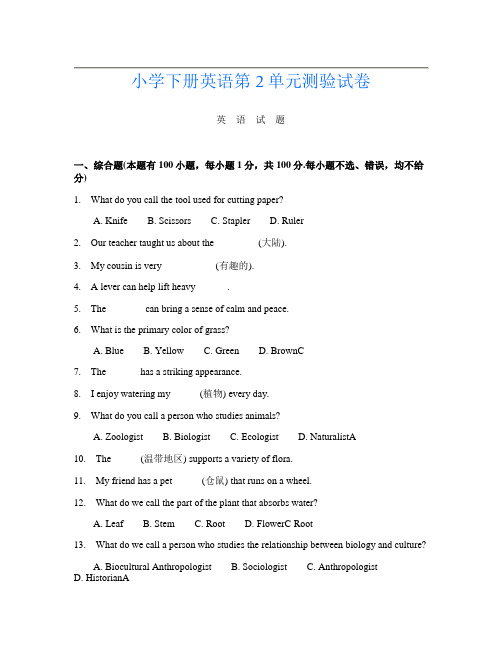
小学下册英语第2单元测验试卷英语试题一、综合题(本题有100小题,每小题1分,共100分.每小题不选、错误,均不给分)1.What do you call the tool used for cutting paper?A. KnifeB. ScissorsC. StaplerD. Ruler2.Our teacher taught us about the ________ (大陆).3.My cousin is very __________ (有趣的).4. A lever can help lift heavy ______.5.The _______ can bring a sense of calm and peace.6.What is the primary color of grass?A. BlueB. YellowC. GreenD. BrownC7.The ______ has a striking appearance.8.I enjoy watering my _____ (植物) every day.9.What do you call a person who studies animals?A. ZoologistB. BiologistC. EcologistD. NaturalistA10.The _____ (温带地区) supports a variety of flora.11.My friend has a pet _____ (仓鼠) that runs on a wheel.12.What do we call the part of the plant that absorbs water?A. LeafB. StemC. RootD. FlowerC Root13.What do we call a person who studies the relationship between biology and culture?A. Biocultural AnthropologistB. SociologistC. AnthropologistD. HistorianA14.The __________ is a region known for its deserts.15. A rabbit can have many ______ (小兔子) each year.16.My brother bought a new _______ (我哥哥买了一个新的_______).17.The flowers are ______ (blooming) beautifully in spring.18.I love _______ (参加) dance classes.19.At the beach, we built a sand ______ (城堡) with buckets and shovels. It was very ______ (大) and fun!20.What is the capital of India?A. MumbaiB. New DelhiC. KolkataD. Bangalore21.What do you call the person who teaches students?A. DoctorB. TeacherC. LawyerD. ChefB22.My friend is a ______. He enjoys acting in plays.23.Certain plants can ______ (改善) air quality in cities.24.We will go to the ______ for a field trip. (aquarium)25.The anteater's long snout is perfect for eating ______ (蚂蚁).26. A _______ solution contains the maximum amount of solute that can dissolve.27.What is the capital of Tonga?A. Nuku'alofaB. Vava'uC. Ha'apaiD. TongatapuA28.What do we call the process of keeping something safe?A. ProtectingB. SavingC. StoringD. Guarding29.Root vegetables like carrots and beets grow ______ the ground. (胡萝卜和甜菜等根茎蔬菜生长在地面下。
征稿英语作文文案模板
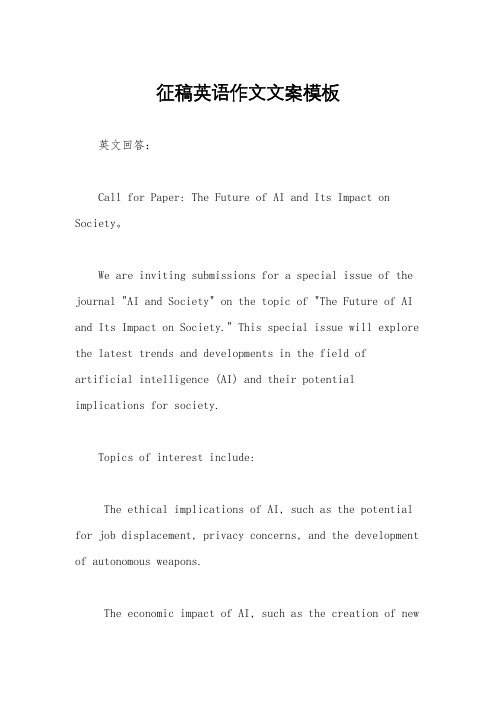
征稿英语作文文案模板英文回答:Call for Paper: The Future of AI and Its Impact on Society。
We are inviting submissions for a special issue of the journal "AI and Society" on the topic of "The Future of AI and Its Impact on Society." This special issue will explore the latest trends and developments in the field ofartificial intelligence (AI) and their potential implications for society.Topics of interest include:The ethical implications of AI, such as the potential for job displacement, privacy concerns, and the development of autonomous weapons.The economic impact of AI, such as the creation of newjobs, the automation of tasks, and the potential for increased productivity.The social impact of AI, such as the effects on communication, collaboration, and creativity.The role of AI in solving global challenges, such as climate change, poverty, and disease.The future of AI and its potential to transform society in unexpected ways.We welcome submissions from a variety of perspectives, including:Researchers in the field of AI。
